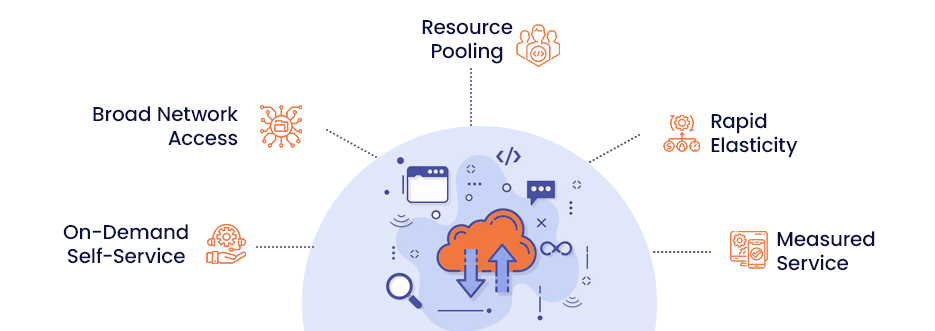Amazon Web Services, or AWS is the best and the most globally adopted cloud computing service. Every worker has the freedom to use more than 170 AWS services from anywhere at any time. Companies in more than 190 countries use AWS. Among them are 5,000 educational technology companies and 2,000 government bodies. Many companies, like ESPN, Adobe, Twitter, Netflix, Facebook, BBC, and more, use AWS cloud computing. Adobe doesn’t need to ask the IT teams for help when they make or change software. It makes money by giving its customers operating systems that have a lot of room. It was easy to use and mix Adobe’s software because it worked with Amazon’s services. So, let’s quickly go over what cloud computing is before we talk about AWS.
What is Cloud Computing?
Cloud computing is when computer services are sent over the Internet. Storage, processing power, networking, databases, analytics, software, intelligence, and storage are some of these services. This lets economies of scale work, resources be used in more ways, and new ideas come up faster. Instead of having to buy and take care of servers and other IT assets. Users can use computing tools and pay for them based on how much they use them.
The key characteristics of cloud computing include:
- On-Demand Self-Service: Self service option is available in case of getting and handling resources.
- Broad Network Access: Cloud services are easily accessible from any device over the internet..
- Resource Pooling: Cloud providers pool computing resources to serve multiple customers, with different physical and virtual resources dynamically assigned and reassigned according to demand.
- Rapid Elasticity: Resources can be rapidly and automatically scaled up or down to accommodate changing workloads, providing flexibility and efficiency.
- Measured Service: Cloud computing solutions are metered, and users pay for only the resources they consume. This pay-as-you-go model allows for cost optimization and efficiency.
Cloud computing is categorized into three main service models:
- Infrastructure as a Service (IaaS): It provides virtualized computing resources over the internet. Users can rent virtual machines, storage, and other infrastructure components.
- Platform as a Service (PaaS): It provides a platform that lets users create, run, and handle apps without having to deal with the complexities. It comes with tools and services for building and deploying apps.
- Software as a Service (SaaS): It provides software tools over the internet in exchange for a monthly fee. Users can use a web browser to view the software without having to install, manage, or keep it up to date.
IaaS vs. SaaS vs. PaaS: Know which model is best?
What is AWS?
AWS (Amazon Web Services) was one of the first companies to offer cloud computing. It has changed how businesses use technology by giving them a big, well-known base. Amazon.com started Amazon Web Services (AWS) in 2006. It has since grown into a full set of cloud services. These services include fast access to storage, databases, computer power, machine learning, analytics, and more. At its core, AWS lets businesses do more than what normal IT can do. It does this by promoting new ideas, scalability, and efficiency without requiring them to spend a lot of money on infrastructure upfront.
AWS Infrastructure
AWS’s strong infrastructure, which is made up of Availability Zones in different parts of the world, is a key part of its abilities. This global network makes sure that services are always available, can handle errors, and have low delay. This lets businesses put applications and services close to their customers for the best user experience.
You can use Amazon EC2 to create virtual servers that you can customize, Amazon S3 to store objects safely, AWS Lambda to do serverless computing, Amazon RDS to handle databases well, and Amazon Polly to use advanced text-to-speech features. When used together, these services let users make, launch, and handle apps in ways that have never been seen before.
A lot of work goes into making sure that Amazon Cloud-based services are safe. They offer many features and safety standards to back this up. Safeguards are used to keep info and apps safe, which makes users feel good about the safety of their digital items. Some of these are network filters, identity management, and encryption.
Benefits of AWS
One of the best things about AWS is that it can grow with your needs. Users can quickly add or remove tools based on what they need. This speeds things up and lowers costs. This type of service keeps costs low because users only pay for the resources they actually use. This is because prices depend on how much you use it.
Amazon Cloud Services is very good at technology, but it has also built a strong ecosystem that encourages partners, coders, and a wide range of clients to work together. Because they work together and are dedicated to always coming up with new ideas. AWS is the leading cloud computing services providers. Changing businesses digitally and shaping the future of technology. AWS is more than just a set of services. It opens up new opportunities for businesses and ushers in a new age of flexibility, scalability, and unmatched technological progress.
What is AWS Cloud Computing?
AWS’s cloud computing has changed the way businesses use their computers in a big way. It gives you a lot of cloud services that are scalable, flexible, and cheap. The main idea behind AWS Cloud Computing is that it lets groups use a lot of different kinds of computers right away over the internet. They can change, grow, and improve their digital work without having to buy a lot of new tools all at once.
Key Characteristics of AWS Cloud Computing:

The most important things about Amazon cloud based services are the basic ideas that make it such a powerful force in the world of technology. When put together, these traits describe how flexible, scalable, and efficient AWS is for companies. Let us go into more information about each characteristic:
-
On-Demand Self-Service:
AWS lets users set up and handle computing resources whenever they need to, without service providers having to do anything. This means that users can access and set up the tools they need, like virtual servers, storage, and databases, without having to wait for approval or for someone to do it for them.
-
Broad Network Access:
Amazon web services are made to be available from a wide range of devices over the internet, which ensures broad network access. Users can join AWS cloud from a variety of devices, such as laptops, smartphones, tablets, and other devices that can connect to the internet. It encourages flexibility by letting users control and access their resources from almost anywhere.
-
Resource Pooling:
Amazon Cloud Services employs resource pooling to efficiently allocate and share computing resources among multiple customers. This includes the dynamic assignment and reassignment of both physical and virtual resources as needed. By pooling resources, AWS optimises utilisation, ensuring that resources are allocated based on demand, leading to improved efficiency and cost-effectiveness.
-
Rapid Elasticity:
AWS is known for its rapid elasticity, which lets users quickly add or remove computer resources based on demand. AWS lets you quickly change resources to fit the needs of an application or workload, whether you’re having times of low activity or periods of an increase in workload. This makes sure that companies can change with the times without having to make big investments up front or make complicated changes to their systems.
-
Measured Service:
AWS operates on a measured service model, where users are billed for the resources they consume. The pay-as-you-go pricing model is a fundamental component of the cost efficacy of AWS. By charging users solely for the computing power, storage, or other services they employ, expenses are precisely correlated with usage. This results in optimal resource utilization and cost-effectiveness for businesses.
Key AWS Cloud Services:
-
Amazon EC2 (Elastic Compute Cloud):
Description: Amazon EC2 provides resizable compute capacity in the cloud, allowing users to launch virtual servers (instances) with varying configurations. EC2 instances cater to diverse workloads, from running applications to hosting websites. Users have the flexibility to choose instances optimized for compute, memory, storage, and more, scaling capacity up or down based on demand.
-
Amazon S3 (Simple Storage Service):
Amazon S3 is an object storage service designed for secure and scalable data storage. Users can store and retrieve any amount of data, and S3 supports various storage classes to optimize costs based on usage patterns. Moreover, it is widely used for backup, archiving, content distribution, and serving static web content.
-
AWS Lambda:
AWS Lambda is a serverless computing service that enables users to run code without provisioning or managing servers. Developers can upload their code, and Lambda automatically handles the execution, scaling, and maintenance. It is ideal for event-driven applications and microservices architecture, allowing for efficient and cost-effective execution of code in response to events.
-
Amazon RDS (Relational Database Service):
Amazon RDS streamlines the administration of databases through the automation of maintenance and scaling, patching, and backups. Prominent relational database engines, such as Oracle, MySQL, PostgreSQL, MariaDB, and Microsoft SQL Server, are among those that are supported. RDS is suitable for applications requiring relational database capabilities without the overhead of administrative tasks.
-
Amazon Polly:
Amazon Polly is a text-to-speech service that transforms written text into natural-sounding speech. Developers can utilize Polly to add voice capabilities to applications, create interactive voice responses, or generate audio content. It supports multiple languages and offers various voices to suit different applications.
-
Amazon DynamoDB:
A completely managed NoSQL database service, Amazon DynamoDB is renowned for its effortless scalability and superior performance. It is intended for data access applications that require minimal latency and is capable of handling a variety of workloads. DynamoDB is suitable for scenarios where quick and predictable database performance is critical.
-
Amazon CloudFront:
Amazon CloudFront is a content delivery network (CDN) service that speeds up the sending of information, like photos, videos, and web pages to users all over the world. CloudFront makes sure that users can access material quickly and with little delay by caching it at edge locations. It works with other AWS services without any problems.
-
AWS Elastic Beanstalk:
The fully managed service AWS Elastic Beanstalk makes it easier to set up and run apps. It works with many programming languages and frameworks. It can also automate jobs like setting up capacity, distributing load, and keeping an eye on applications. Elastic Beanstalk allows developers to focus on writing code without managing the underlying infrastructure.
-
AWS SNS (Simple Notification Service):
AWS SNS is a fully managed messaging service that enables the delivery of messages or notifications to distributed recipients through various protocols. It supports SMS, email, HTTP, Lambda, and more, providing a flexible and scalable solution for event-driven architectures.
-
Amazon VPC (Virtual Private Cloud):
Amazon VPC allows users to create a logically isolated section of the AWS Cloud, providing control over the virtual networking environment. Users can define IP addresses, create subnets, and configure route tables, ensuring a secure and customizable networking setup for their AWS resources.
Benefits of AWS Cloud Computing:
- Cost Efficiency: Pay for what you use, eliminating the need for upfront capital expenses and providing a cost-effective solution for businesses of all sizes.
- Global Reach: AWS is spread out across many areas around the world, so companies can put their apps and services close to their customers for faster access.
- Security and Compliance: AWS puts security first by offering a wide range of tools and features, such as encryption, identity management, and compliance licenses.
- Scalability: You can easily add or remove computing tools based on demand, making sure that performance is at its best during busy times.
- Innovation: AWS continually introduces new services and features, allowing businesses to stay at the forefront of technological advancements and foster innovation.
Take the First Step Today Towards Cloud Revolution
Connect With Our Cloud consultants for embracing cloud computing now
Why do we need AWS Cloud Computing Services?
Cloud computing from Amazon Web Services (AWS) has many benefits that help businesses. Along with developers, groups improve, grow, and make the most of their IT infrastructure. Here are some of the reasons why we need AWS Cloud Computing services:
-
Cost Efficiency:
Users of AWS only pay for the computing resources they use because it uses a pay-as-you-go pricing scheme. This gets rid of the need to buy gear up front, and users can adjust the resources based on demand.
-
Global Reach and Scalability:
With a vast network of data centers worldwide, AWS enables businesses to deploy applications and services in multiple regions, ensuring low-latency access for end-users globally. AWS’s scalability allows users to scale computing resources elastically, accommodating varying workloads and ensuring optimal performance.
-
Security and Compliance:
AWS prioritizes security and compliance, implementing robust security measures to protect data and applications. This includes encryption, identity and access management, network firewalls, and compliance certifications. Users benefit from a secure cloud environment that adheres to industry standards and regulations.
-
Flexibility and Agility:
AWS offers many services and tools that can be used for various tasks and programs. Companies can pick the ideal mix of services to meet their wants thanks to this adaptability. AWS’s flexibility also lets resources be quickly deployed, which cuts down on the time it takes for apps and services to reach customers.
-
Innovation and Continuous Improvement:
AWS is always adding new services, features, and changes, making it the leader in cloud innovation. This makes sure that users can access the latest technologies, which helps them come up with new ideas and stay ahead.
-
Reliability and High Availability:
AWS offers high availability and reliability through its network of Availability Zones (AZs) and data centers. Applications deployed on AWS can achieve high levels of availability, with automatic failover and redundancy options. This minimizes downtime and ensures a reliable user experience.
-
Scalable Storage Options:
AWS provides scalable and durable storage solutions, such as Amazon S3, allowing users to store and retrieve any amount of data. Users can choose from various storage classes based on their specific requirements, optimizing costs while ensuring data durability and accessibility.
-
Serverless Computing with AWS Lambda:
AWS Lambda enables serverless computing, eliminating the need for users to manage servers. Developers can focus on writing code without worrying about infrastructure management. AWS Lambda executes code in response to events, providing a scalable and cost-effective solution for event-driven applications.
-
Managed Database Services:
AWS offers managed database services, such as Amazon RDS, which simplify database administration tasks, including backups, patching, and scaling. This allows users to focus on application development rather than database management, enhancing operational efficiency.
-
Ecosystem and Community Support:
AWS has cultivated a vibrant ecosystem of partners, developers, and a supportive community. Users can leverage a wide range of third-party applications available in the AWS Marketplace and access a wealth of resources, documentation, and community forums for support and collaboration.
How AWS has Changed the Game for Cloud Computing?
Amazon Web Services (AWS) has changed how companies work. AWS was one of the first companies to use cloud computing to help businesses build and grow by giving them the tools, resources, and freedom they need. The company’s new, low-cost options keep moving the industry forward, which makes AWS’s future look brighter. Here are the seven most important ways that AWS has changed things:
- AWS’s pay-as-you-go pricing plan is a cost effective solution, which lets companies save money and energy by only paying for the services they use. This new way of setting prices has made it possible for small and large businesses to fight on an even playing field.
- AWS lets companies change the size of their operations based on their needs. The auto-scaling tool quickly changes the infrastructure of servers and resources. This makes it easier for businesses to respond to changes in the market.
- Businesses can store private info safely with AWS. AWS offers a wide range of security features and tools that keep an eye on data and keep it safe from possible risks.
- Because AWS is based in the cloud, businesses can launch their goods and services in seconds. It gets rid of the need to set up and maintain real infrastructure, which speeds up the release of new products.
- AWS has data centers all over the world. This benefit helps companies put their services and apps closer to their customers, which cuts down on delay and downtime.
- AWS makes management easier: Businesses can control all of their computing tools from a single screen, which makes it simple to keep an eye on things and make the most of their operations. They also hire developers and other people for their business from time to time. It looks like a bright future for many AWS jobs.
- AWS is always changing and adding new services and features all the time. This lets companies benefit from the progress in technology.
Don’t Lag Behind, Soar Ahead – Adopt Cloud Computing Now
Top Trends in AWS Cloud Computing
-
Serverless Computing:
Serverless computing, exemplified by AWS Lambda, is gaining prominence. This trend enables developers to focus on writing code without managing servers, allowing for greater efficiency and cost-effectiveness.
-
Edge Computing:
As the demand for low-latency applications grows, edge computing has become a prominent trend. AWS’s edge services, like AWS Wavelength, bring computing resources closer to end-users, facilitating faster response times for applications.
-
Machine Learning and AI Integration:
AWS provides a comprehensive set of machine learning and artificial intelligence services, such as Amazon SageMaker and AWS DeepLens. The integration of AI capabilities into applications and workflows is a key trend, enabling businesses to extract insights and enhance decision-making.
-
Hybrid and Multi-Cloud Architectures:
Organisations are adopting hybrid and multi-cloud architectures to leverage the benefits of both on-premises and cloud environments. AWS’s services like AWS Outposts support seamless integration with existing infrastructure.
-
Containers and Kubernetes:
Containerization and orchestration using services like Amazon ECS (Elastic Container Service) and Amazon EKS (Elastic Kubernetes Service) are gaining popularity. This trend allows for efficient deployment, scaling, and management of containerized applications.
-
Serverless Containers:
The intersection of serverless and containerization is a growing trend. AWS Fargate allows users to run containers without managing the underlying infrastructure, combining the benefits of both serverless and containers.
-
Security and Compliance Focus:
With an increasing emphasis on security, AWS continues to enhance its security services and features. Trends include improved identity and access management, encryption services, and compliance certifications to meet industry-specific regulatory requirements.
-
Data Lakes and Analytics:
AWS provides services like Amazon S3 for data storage and Amazon Redshift for analytics, contributing to the trend of building data lakes. Organizations leverage these services to store, process, and analyze vast amounts of data for business insights.
-
DevOps and CI/CD Integration:
DevOps practices and continuous integration/continuous delivery (CI/CD) pipelines are integral to modern application development. AWS supports these practices with services like AWS CodePipeline, AWS CodeBuild, and AWS CodeDeploy.
-
Quantum Computing Exploration:
Quantum computing is an emerging trend in cloud computing, and AWS is actively exploring this frontier with services like Amazon Braket. While still in the experimental phase, quantum computing has the potential to revolutionize certain computational tasks.
-
Blockchain Solutions:
AWS offers blockchain solutions through Amazon Managed Blockchain. This trend involves the exploration of decentralized and secure ledger technologies for various use cases, including supply chain management and financial services.
-
5G Integration:
As 5G networks become more prevalent, AWS is working on integrating cloud services with 5G capabilities. This trend aims to enable new applications and services that leverage the high-speed, low-latency capabilities of 5G networks.
Learn about the emerging trends in cloud computing for 2024
Transformation of Different industries with AWS Cloud computing
| Industry | Transformation | AWS Services and Examples |
|---|---|---|
| Healthcare | Revolutionizing patient care through secure storage and analysis of healthcare data. | – Amazon Comprehend Medical, Amazon HealthLake |
| Financial Services | Enhancing agility, security, and compliance in financial operations. | – Amazon Aurora, AWS Key Management Service, Amazon Macie |
| Manufacturing | Improving efficiency with predictive maintenance and smart manufacturing. | – AWS IoT services, Amazon SageMaker |
| Retail and E-commerce | Enhancing customer experience, optimizing inventory, and personalizing marketing. | – Amazon Personalize, Amazon Forecast |
| Education | Facilitating e-learning platforms, content delivery, and student analytics. | – Amazon S3, Amazon WorkSpaces |
| Energy | Optimizing resource management, monitoring infrastructure, and improving energy production. | – AWS IoT services, Amazon EMR |
| Telecommunications | Driving the transition to 5G networks and supporting network functions virtualization (NFV). | – Amazon Elastic Kubernetes Service (EKS) |
| Media and Entertainment | Revolutionizing content creation, distribution, and streaming. | – Amazon Elastic Transcoder, Amazon Kinesis, AWS Elemental MediaLive |
| Agriculture | Enabling precision farming, crop monitoring, and supply chain optimization. | – AWS IoT services |
| Transportation and Logistics | Optimizing route planning, shipment tracking, and supply chain efficiency. | – AWS IoT services, Amazon Recognition |
Conclusions
In the history of technology progress, 2024 is a big year. AWS Cloud Computing services are at the forefront of this revolution, having an effect that has never been seen before. As more and more businesses go digital, AWS becomes more than just a service provider. It becomes a creative leader who changes the way businesses work, how they innovate, and how they can grow. The flexibility of AWS Cloud Computing services is still one of the things that makes them stand out. It lets businesses easily manage the complicated digital world. The cloud computing company is dedicated to constant innovation, as shown by the growing number of cloud services available on the Amazon Web Services (AWS) platform.
This makes it a key resource for businesses that want to stay ahead of the curve. AWS has had a revolutionary effect that goes beyond traditional ideas. It has created an environment where businesses can not only adapt but also grow. The cloud services on the AWS platform expand what is possible in terms of scale, security, and efficiency. This lets businesses go beyond their limits and reach their full potential.
As we look into the future, it’s clear that AWS has had a big impact on how cloud computing is told. It has an effect on digital communities in many fields, from healthcare to agriculture. This shows that it can meet specific needs and encourage new ideas. The AWS platform isn’t just a tech answer. It’s also a strategic ally for companies that want to find success in 2024’s fast-changing world.
FAQs
How does AWS position itself in the competitive landscape of cloud computing companies?
AWS stands out with its comprehensive cloud services, constant innovation, and robust Amazon Web Services platform. This makes it a leader in the industry.
What distinguishes AWS from other cloud service providers for businesses seeking cloud solutions?
The AWS platform offers a broad spectrum of services, ensuring scalability, security, and efficiency, making it an ideal choice for businesses navigating the complexities of the digital realm.
Can AWS Cloud Computing services benefit startups looking for a scalable infrastructure?
Absolutely, AWS provides the flexibility and scalability needed for startups to grow rapidly without substantial upfront investments, making it an ideal choice for emerging businesses.
How does AWS contribute to the digital transformation journey of established enterprises?
AWS offers tailored solutions and specialized services that align with the unique needs of various industries, empowering established enterprises to drive digital innovation.
What security measures does AWS have in place to address concerns related to data privacy?
AWS implements robust security features, encryption options, and compliance certifications, ensuring the highest standards of data privacy and regulatory compliance.
In what ways can businesses leverage AWS Cloud Computing services to stay ahead in the evolving technological landscape?
Businesses can leverage AWS to stay ahead by embracing the diverse cloud services, staying updated with continuous innovation, and aligning their strategies with the dynamic offerings of the AWS platform.












